
by DharamCW | Jun 26, 2025 | Professional Resilience and Inspiration Stories, Program Management
🌟 Program Management Professional (PgMP) Success Stories | Feb 2025 – Jun 2025 🌍
🚀 A Global Celebration of Excellence!
A huge congratulations to the newest PgMP® certified professionals who achieved this prestigious milestone between February 2025 and June 2025 with vCare Project Management! 🎉
📌 A Proud Milestone:
Since our inception, we have been honored to mentor and guide 571 professionals across 58 countries toward their PgMP® success. This milestone is a reflection of the dedication, resilience, and strategic excellence our global community brings to the world of program management.
Each success story represents not just a certification, but a transformational journey toward leadership at the highest level.
🌍 PgMP® Global Landscape:
✅ Approx. 7,900+ Active PgMPs worldwide
✅ Top Five Countries:
-> China:2581
-> United States: 1583
-> Saudi Arabia:707
-> India:651
-> Canada: 389

571 professionals. 58 countries. One global PgMP® community. Celebrating success from Feb to June 2025 with vCare Project Management.
🔥 What’s Next for You?
📌 Are you ready to join this elite league of program managers?
📌 Looking for expert guidance on the PgMP® application, preparation, or exam strategy?
Let’s talk! Obligation-free consultation session using http://talktodharam.com, and let’s shape your PgMP® success story together!
View our upcoming PgMP Programs
Online – http://bit.ly/2oBKQXQ
Direct – http://bit.ly/2oCfpg0
Join our PgMP4U LinkedIn Group for the latest updates – http://bit.ly/2SBPwIp
Explore our useful PgMP Study Materials:
The Standard for Program Management | Fifth Edition – https://bit.ly/43lqq4I
PgMP Challenger Gold (Mock Exams 1 to 5) | Exam Simulator – https://bit.ly/3NGrysU
PgMP Challenger Silver (Mock Exams 1 to 3) | Exam Simulator – https://bit.ly/44rOIKY
For more insights into program management certification, training, and career development, book a personalized, obligation-free consultation session using http://talktodharam.com
Looking to deepen your knowledge?
Check out our upcoming webinars featuring global experts,
Unlock PMO Success with PMI-PMOCP™: A Special Session with Kim Marcelliano – bit.ly/3Sp9h5l
To all aspiring leaders out there: keep pushing boundaries, embracing challenges, and inspiring change. Together, let’s shape the future of program management—one milestone at a time.
#PgMP #ProgramManagement #PgMPSuccess #PMICertification #vCareProjectManagement #PgMPTraining #PgMPExamPrep #PgMPApplication #ProgramLeadership #PMICertifications #GlobalPgMP #DharamSingh #StrategicLeadership #PgMP4U #PgMPChallenger #PgMPMentoring #USA #China #India #SaudiArabia #Canada

by DharamCW | Jun 22, 2025 | Leadership in Project Management, Professional Resilience and Inspiration Stories, Program Management
Is your organization building ships — or shaping leaders who can steer strategic transformation?
That’s the kind of question we explored with Austal USA‘s program leaders during a powerful 3-day PgMP® Bootcamp in Charlottesville, Virginia.
🗓️ Date: May 28–30, 2025
📍 Location: Charlottesville, VA, USA
🎯 Focus: Empowering Austal’s Program Managers with PgMP® principles that align execution with enterprise strategy.
Austal, a globally recognized force in shipbuilding and defense, brought together a group of thoughtful, driven professionals. What stood out? Their willingness to rethink leadership, embrace strategic thinking, and reframe program execution as a tool for transformation.
This wasn’t just about frameworks — it was about translating theory into action through real-world conversations, challenges, and insights. Their energy, discipline, and curiosity made this journey meaningful for everyone involved.
To the entire Austal team: thank you for your professionalism and drive. It was an honor to be part of your leadership journey.

PgMP Bootcamp with Austal USA – Empowering program leaders to align execution with enterprise strategy.
👥 Interested in strengthening your program leadership team?
Our PgMP® Corporate Bootcamps are available globally.
📩 Email: team@vcareprojectmanagement.com
📞 Call: +1 9722927588
🔗 Book a Free consultation: http://talktodharam.com
#PgMP #ProgramManagement #StrategicLeadership #CorporateTraining #LeadershipDevelopment #AustalUSA #DefenseIndustry #Shipbuilding #PgMPBootcamp #vCareProjectManagement #DharamSingh #ProgramLeadership #EnterpriseStrategy #PgMPMentoring #CareerGrowth #MentorshipMatters #ProgramExecution #ProgramSuccess #LeadershipJourney #TransformationLeadership

by DharamCW | Jun 14, 2025 | Leadership in Project Management, PMI Certification Success Stories, Professional Resilience and Inspiration Stories
🎉 Celebrating PfMP Success: March 2025 – May 2025! 🌟
A huge congratulations to all professionals who achieved their Portfolio Management Professional (PfMP) certification with the support of vCare Project Management! 🎯
🚀 We are thrilled to share that the global PfMP® community has now grown beyond 2,100+ certified professionals, with 176 new PfMP®s across 36 countries who trusted vCare’s expertise in their journey.
This milestone reflects the effectiveness of our structured training, mentorship, and exam preparation resources. We are proud to be part of your success and look forward to guiding more professionals to achieve excellence in portfolio management.

176 new PfMPs certified across 36 countries! Congratulations from vCare Project Management – March to May 2025.
🔹 Ready to elevate your portfolio management career?
Let’s make your PfMP® journey a success! DM me for guidance.
📌 Explore Our PfMP® Programs:
🌐 Online Training → http://bit.ly/39jOZSf
🏛 Direct Training → http://bit.ly/38er2M3
📌 Join Our PfMP® Community:
PfMP4U LinkedIn Group → http://bit.ly/31P7GKR
📌 Essential PfMP® Study Materials:
PfMP Pathfinder – https://bit.ly/35j9Dli
The Complete Reference Guide for PfMP Certification – https://bit.ly/3pU4ud5
PfMP Challenger Mock Exam 1 | Exam Simulator – https://bit.ly/3KKZkv3
PfMP Challenger Mock Exam 2 | Exam Simulator – https://bit.ly/3VlI5FH
PfMP Challenger Mock Exam 3 | Exam Simulator – https://bit.ly/3VNrfRL
PfMP Challenger Gold (Mock Exams 1 to 3) | Exam Simulator – https://bit.ly/3KCjbNh
📌 Register for our Upcoming Webinars:
🔹 Strategic Leadership & Operational Excellence featuring Jay Brough – bit.ly/41sSraX
🔹 Unlock PMO Success with PMI-PMOCP™: A Special Session with Dharam & Kim – bit.ly/3Sp9h5l
📌Need expert guidance? Book a free consultation with me: http://talktodharam.com
🎥 Stay Updated with Project Management Insights!
🔔 Subscribe to vCare Project Management YouTube Channel: https://bit.ly/2YF0wJl
🎙 Follow My Podcasts & Expert Interviews: https://bit.ly/2NDY8wd
#PfMP #PortfolioManagement #PfMPCertification #vCarePfMP #PMICertification #ProjectManagement #CareerGrowth #SuccessStory #GlobalCommunity #DharamSingh #PfMP4U #PfMPTraining #PfMPPathfinder #Leadership #MentorshipMatters #PfMPChallenger #CertificationJourney #PortfolioSuccess #PfMPMentoring #StrategyExecution
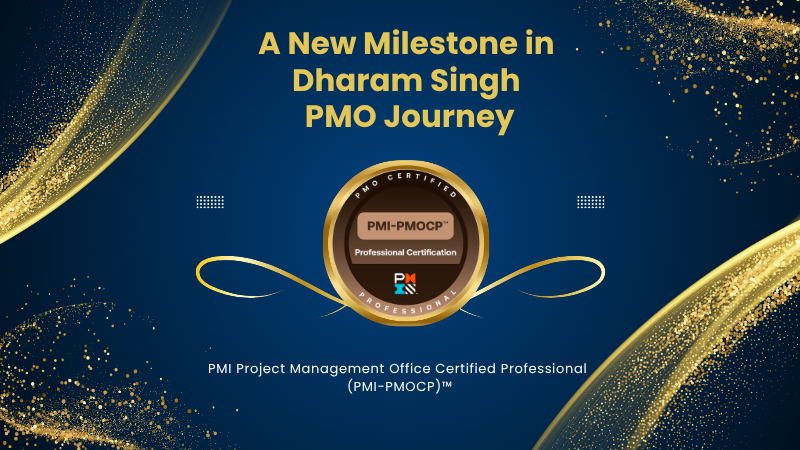
by DharamCW | Jun 13, 2025 | Professional Resilience and Inspiration Stories
🌟 What keeps you going when the path is tough, unclear, and constantly evolving?
For me, it has always been a blend of Ikigai –> the reason for being and Kaizen –> continuous improvement. Today, I’m humbled and excited to share that I have officially earned the PMI Project Management Office Certified Professional (PMI-PMOCP™) credential from the Project Management Institute.
👉 https://lnkd.in/gh58pKjd
This certification marks not just a personal milestone, but a reaffirmation of what matters most — delivering value-driven, strategically aligned PMO leadership in a rapidly transforming world.
💡 I extend my heartfelt gratitude to the incredible project, program, and portfolio management professionals around the globe whose perseverance, curiosity, and spirit of excellence have continuously inspired me. Many of you have been part of my learning journey — as mentors, peers, and students. Thank you!
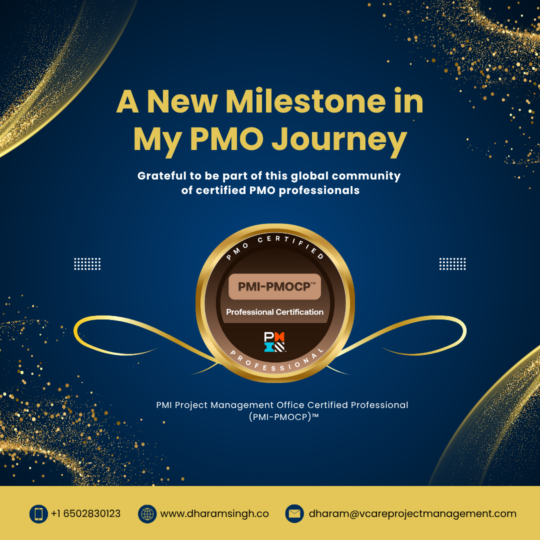
Dharam Singh earns the PMI-PMOCP™ credential — Project Management Office Certified Professional
🎤 To celebrate this milestone, I invite you to an upcoming awareness session:
Unlock PMO Success with PMI-PMOCP™: A Special Session with Dharam & Kim
🗓️ Date: July 2nd, 2025
🕙 Time: 10:00 AM – 11:00 AM PDT
🎙️ With Kim Marcelliano, Senior Product Manager at Project Management Institute
🔗 Register here : https://bit.ly/3Sp9h5l
📚 If you are looking to become PMI-PMOCP™ certified, we’re launching PMI-PMOCP Certification Training Programs:
🧭 Direct Bootcamps Dallas, Texas, United States:
• 27–28 August: https://bit.ly/3Zqlgn2
• 29–30 September: https://bit.ly/4drorAA
🌐 Online Bootcamps:
• 30–31 August: https://bit.ly/4jbZGcY
• 6–7 September: https://bit.ly/4mrfBHo
🚀 I believe PMOs are no longer just governance engines — they are strategic enablers. With frameworks like PMI-PMOCP™, we now have a global standard to guide that transformation.
🔍 What role do you see PMOs playing in the AI-driven, strategy-focused organizations of tomorrow? Would love to hear your thoughts.
🎙️ Got questions about your Project Management career or PMI certifications?
Book your FREE 15-min session with me at 👉 www.talktodharam.com
📞 Contact Us
Call: 650-283-0123
Email: info@vcareprojectmanagement.com
🎧 Subscribe & Stay Ahead
Webinars & Success Stories: https://bit.ly/2YF0wJl
Podcasts & Interviews: https://bit.ly/2NDY8wd
#PMOCP #PMICertified #PMOLeadership #StrategicPMO #DharamSingh #vCareProjectManagement #Kaizen #Ikigai #PMOTransformation #ProjectManagement #PMICertification #MentorshipMatters #FutureOfWork #ContinuousLearning #PMOCareer #AIandPMO #LeadershipMilestone #CareerSuccess #PMIBootcamp #PMITraining
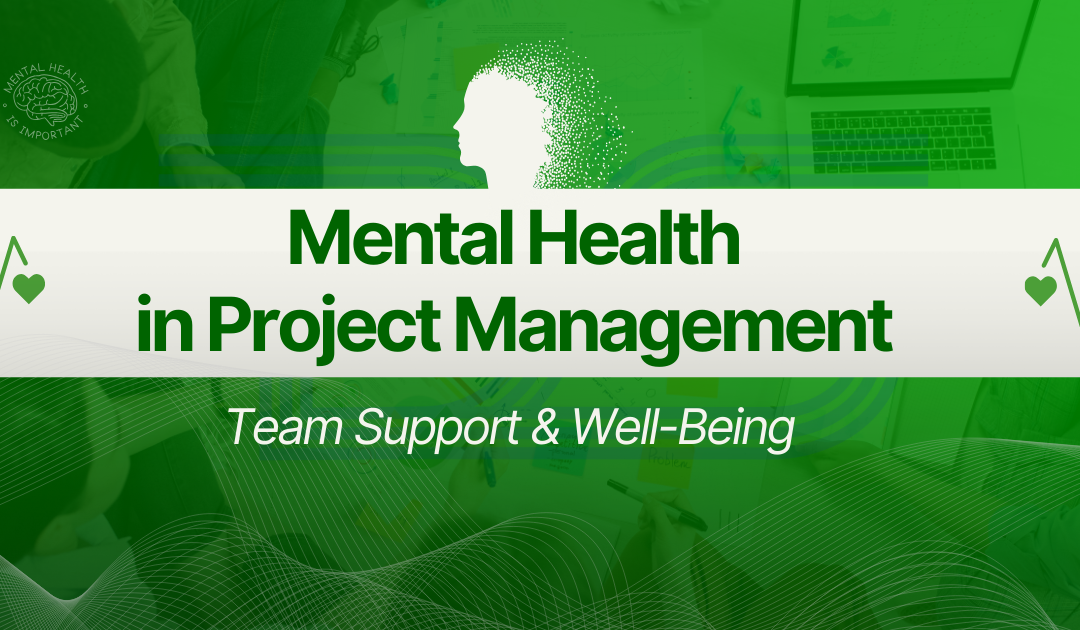
by DharamCW | May 25, 2025 | General, Leadership in Project Management, Personal, Professional Resilience and Inspiration Stories
Project management is a challenging yet rewarding task in the corporate world, requiring multitasking, team dynamics, and timely delivery. Project managers are responsible for enhancing team wellbeing and stress reduction, benefiting both the team and themselves. They can achieve this by providing realistic timeframes, budgets, and fostering high-performing teams. They also monitor team performance to identify signs of burnout and stress, offering coping mechanisms when needed. Project managers must prioritize their teams’ welfare by engaging in their duties to manage projects and lead teams.
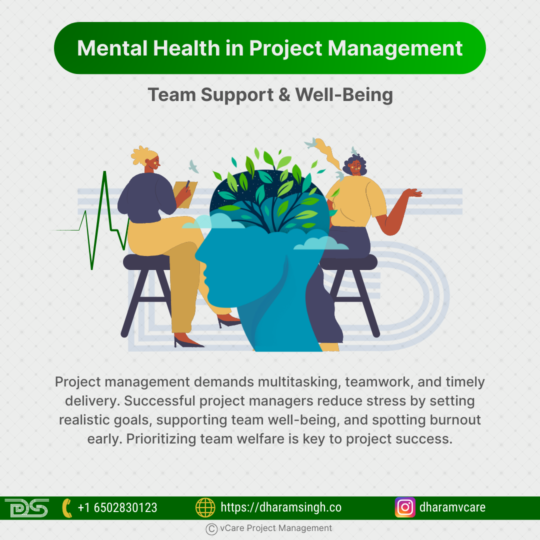
Great project managers don’t just lead projects—they lead people. Supporting team wellbeing drives sustainable success and peak performance.
Project management is a demanding field that requires balancing deadlines, team relations, and excellence. The corporate culture often overlooks the importance of mental health treatment, creating an artificial opposition between vulnerability and toughness. Project managers can model a new leadership culture that prioritizes project success and mental health. This requires a more nuanced definition of resilience, focusing on emotional intelligence, adaptability, and an active attitude towards mental health.
To address this issue, project managers should promote open conversations about mental health and implement policies that enhance team members’ welfare. This article is aimed at project managers and organizations looking to build leadership skills and create a culture where mental health is a key element of success.
Why Mental Health Matters in Project Management?
Mental health is essential in project management since an anxious or burnt-out team will be able to significantly contribute to the failure of a project by causing low productivity, bad decisions, increased turnover, and ultimately, project failure; hence, giving mental health priority in a project team is very important to get best project outcomes.
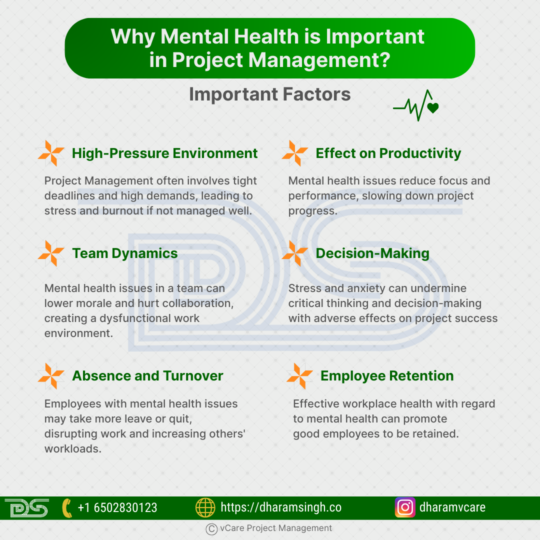
Strong project management starts with strong minds. Learn why prioritizing mental health leads to resilient, high-performing teams.
Important factors why mental health is important in project management:
1. High-pressure environment: Project management is most frequently marked by tight schedules, complicated activities, and high expectations, which readily create burnout, stress, and anxiety if not properly handled.
2. Effect on productivity: When employees are suffering from mental health problems, their attention, concentration, and overall performance are diminished, leading to a deceleration in project progress.
3. Team dynamics: Having an employee with mental issues can ruin team morale and collaboration, leading to a dysfunctional working environment.
4. Decision-making: Stress and anxiety can undermine critical thinking and decision-making with adverse effects on project success.
5. Absence and turnover: Mental illness workers will likely take more sick leave or leave the company, causing disruption to operations and adding workloads to other employees.
6. Employee retention: Effective workplace health with regard to mental health can promote good employees to be retained.
Common Mental Health Challenges in Project Management
Common mental health problems faced by the project managers are stress, anxiety, burnout, depression, and sleep disturbance, typically triggered by problems like tight deadlines, high stakes, complex demands of the projects, scope changes, and inadequate resource allocation, which leave the managers feel overwhelmed and out of control.
Discussions on mental health are becoming increasingly common in the workplace, since 15% of workers between the ages of 18 and 29 believe their mental health is severely bad. 70% of senior staff members lack the requisite training to have conversations with their teams on mental health, according to a recent National Alliance on Mental Illness (NAMI) survey. Also, The World Health Organization estimates that depression and anxiety cause 12 billion lost working days a year, which translates into $1 trillion in lost productivity. This means that an employee’s mental health has a big influence on their company. As a result, workplace mental health has to be given more attention.
The following are some professional mental health risk factors:
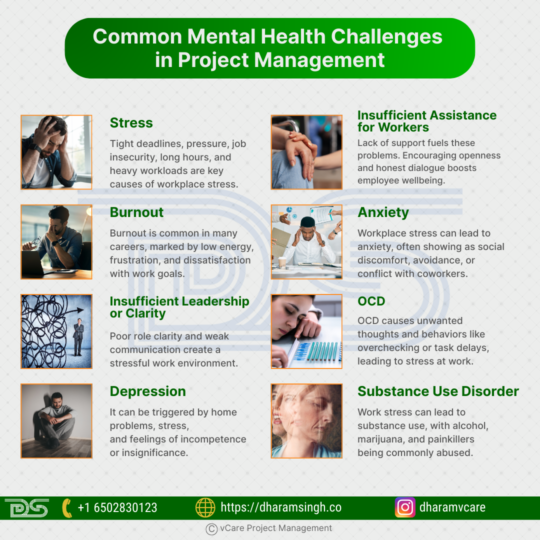
Recognize the warning signs. From stress and burnout to anxiety and OCD—mental health challenges are real and manageable in the workplace.
· Stress – This is the primary cause of poor mental health at work. Deadlines, pressure from supervisors or coworkers, job uncertainty, long hours, and a high workload are all sources of stress.
·Burnout – The majority of employees encounter burnout at some point throughout their career. Lack of drive and enthusiasm, impatience, irritation, and dissatisfaction with work objectives and achievements are all signs of job burnout.
· Insufficient leadership or clarity – A stressful work atmosphere is created when roles and duties are not clearly defined, or when management and staff do not communicate effectively.
· Insufficient assistance for workers – The root cause of all of these issues and more is a lack of employees support. By offering forums for employees to voice their thoughts, complaints, and opinions, being transparent about mental health concerns are all ways to support employees.
· Depression – Depression, a major depressive disorder, affects 17.3 million adults in the U.S., including 7.1% of people aged 18 and older. It can be triggered by home problems, stress, and feelings of incompetence or insignificance.
· Anxiety – Anxiety is a common mental health issue in the workplace, often resulting from stress. It can manifest as social anxiety, which involves avoiding happy hours, difficulty confronting co-workers, or interpersonal struggles. General anxiety, on the other hand, is characterized by worry about the future at the company, constant stress over deadlines or tasks, or perceived tension and disaster.
· OCD – Obsessive-Compulsive Disorder (OCD) is a serious disorder that can manifest as persistent, unwanted thoughts or obsessions, multiple rereads of a project, or difficulty completing daily tasks. These issues can lead to significant stress and strain in the workplace.
· Substance Use Disorder – Triggered by stress or negative work-related issues, often leads to substance use. Commonly abused substances include alcohol, marijuana, and painkillers. This is not just a one-time event; it’s a mental disorder involving brain rewiring and chemical imbalances. 9.5% of working adults have a substance use disorder, and it can lead to poor decision-making, missed work, increased conflict, and other negative outcomes.
Reasons why mental illness peaked in project management in recent times
· Unrealistic timelines: Tight deadlines might create unnecessary tension and lead to rushed decisions.
· Scope creep: Ongoing variations in project scope can lead to confusion and cumulative workload.
· Lack of adequate communication: Unclear communication to stakeholders can develop misunderstandings and tension.
· Poor resource allocation: Insufficient human resources or necessary competencies to carry out a project might lead to frustration and burnout.
· Work-life imbalance: Failure to separate work life and personal life with long work hours and unnecessary demands.
Ways to minimize mental health problems in project management
· Healthy work-life balance: Support normal breaks, holidays, and flexible working hours.
· Open communication: Build an open atmosphere where staff members are free to openly speak about problems and concerns.
· Good project planning: Set attainable objectives, handle expectations, and forecast potential risks.
· Stress management methods: Provide exposure to mindfulness instruction, relaxation training, and staff aid schemes.
· Leadership development: Provide project managers with the ability to handle stress, delegation, and assistance of team members.
The Role of Project Managers in Supporting Mental Health of their team members
Project managers play a crucial role in fostering a healthy workplace by addressing the mental health of their team members. Overwork, poor management techniques, and lack of support can lead to stress, anxiety, and despair, resulting in a toxic atmosphere. Bullying and harassment may also contribute to these issues. To overcome these issues, project managers should identify their root causes and adopt proactive measures such as stress management resources, leadership training, anti-harassment measures, and a positive work atmosphere. This not only improves team performance and project success but also fosters a healthier workplace by ensuring that excessive demands do not worsen team members’ mental health.
Project Managers’ Role in Mental Health
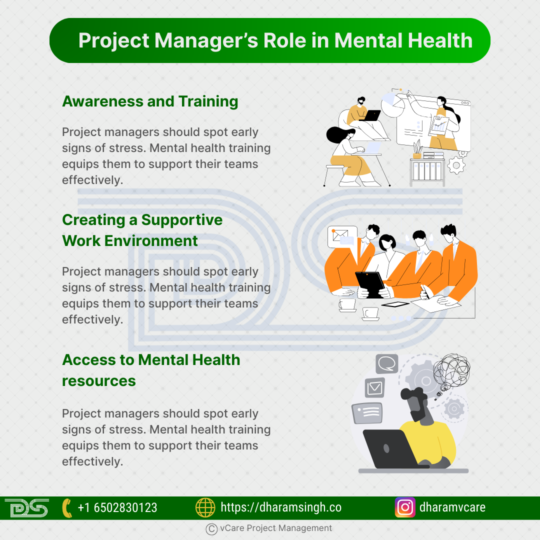
Project managers can shape a healthier workplace. From awareness to access—lead the change for better mental wellbeing in your teams.
· Awareness and Training:Project managers must be able to identify the early signs of mental stress. Training that emphasizes mental health awareness may provide managers the tools they need to properly assist their personnel.
· Creating a Supportive Work Environment:It’s critical to have a culture at work that values employees’ well-being. Realistic expectations, breaks, and open discussions regarding mental health issues should all be promoted by managers.
· Access to Mental Health resources:It’s critical to guarantee that team members have access to mental health assistance. This entails forming relationships with healthcare providers and providing resources in an accessible manner.
Facts that Long-Term Effects of Ignoring Team’s Mental Health in project management
· Impact on Productivity:Long-term stress and burnout impair team productivity and project success in addition to lowering individual performance.
· Issues with Retention and Turnover: An expensive and disruptive cycle of training and retraining can result from high turnover rates, which are a result of high stress conditions.
· Organizational Reputation:Businesses that have a bad reputation for handling work-related stress may have trouble attracting top people, which might hurt their ability to compete in the market.
Ways to Improve Mental Health amongst the team members in project management
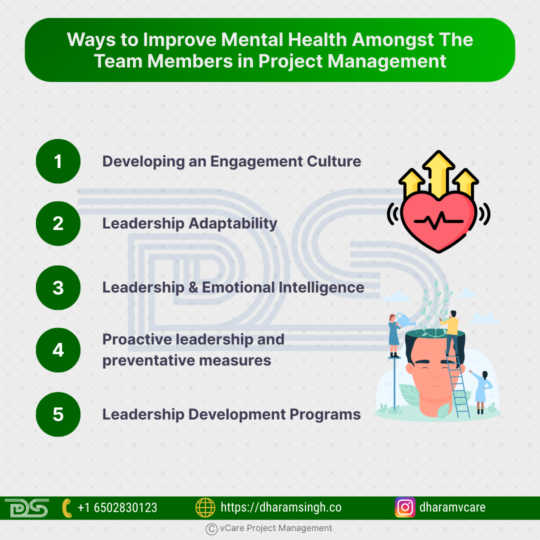
Effective leadership goes beyond task management. Learn five ways project leaders can nurture mental health and build resilient, thriving teams.
1. Developing an Engagement Culture
Leadership principles have a significant impact on a team’s culture. For example, democratic and transformative leaders frequently promote an environment of transparency and participation. These settings foster initiative and idea sharing among team members, which can boost their commitment to project results and job happiness. Effective communication, mutual support, and a shared goal are all characteristics of engaged teams that lower the risk of burnout.
2. Leadership Adaptability
The flexibility of leadership styles is a crucial element that isn’t specifically addressed in the table. In order to better address the demands of their team under changing conditions, effective leaders frequently combine aspects of several styles. For instance, in order to swiftly establish precise goals and standards in the early phases of a project, a more autocratic approach may be required. Including democratic components can assist the team stay engaged and motivated as the project moves forward, lowering the stress and powerlessness that cause burnout.
3. Leadership & Emotional Intelligence
In order to manage stress and avoid burnout, leaders must possess emotional intelligence. Emotionally intelligent leaders are able to identify the psychological and emotional requirements of their team members. They are skilled at adapting their support, encouragement, and communication tactics to the moods of the team and the individual. This skill is especially helpful in high-stress situations when customized support may reduce tension before it becomes burnout.
4. Proactive leadership and preventative measures
The goal of proactive leadership is to foresee certain stressors and put plans in place to lessen them before they have an adverse effect on the team. By proactively identifying the symptoms of burnout, leaders may reduce stress by adjusting workloads, project scopes, and deadlines. Furthermore, providing tools for mental health assistance, such as stress management classes and access to counseling, may improve team well-being.
5. Leadership Development Programs
Project managers and leaders may successfully modify their management style to meet the demands of their team by investing in leadership development programs. The range of conflict resolution, emotional intelligence, stress management, and leadership styles should all be included in these programs. A more thorough knowledge of how leadership affects mental health might help organizations better equip their leaders to build wholesome, effective teams.
Many people still fail to recognize the intensity of stress at work, concentrating only on results and ignoring the human factor. Project managers who are unable to adequately manage workload risk not only team burnout but also leadership failure.
Including Mental Health Wellness Techniques in Project Management
· Proactive Mental Health Initiatives:Implementing proactive mental health efforts, including as wellness programs, stress management seminars, and routine mental health check-ins, can aid in the early detection and treatment of mental health and stress-related problems.
· Flexible Work Schedules:Promoting remote work and flexible work schedules may greatly lower stress, enhance work-life balance, and, consequently, improve mental health.
· Systems for Acknowledgment and Compensation:A more balanced attitude to work is encouraged by putting in place procedures that acknowledge and reward both results and good work habits, which highlights the significance of mental health.
Project managers are tasked with protecting their team’s mental health, preventing stress and fostering a productive work environment. They must prioritize their teams’ mental and emotional health above any project milestone. By broadening their focus to include these crucial components, project managers can ensure their teams are not only successful but also content and healthy in their work environments, ensuring a healthy and productive work environment.
Toolkit for Project Managers and Teams on Mental Health
Building a Mental Health Toolkit for company employees entails gathering tools and tactics to promote workers’ mental health.
Here are some essential components to incorporate:
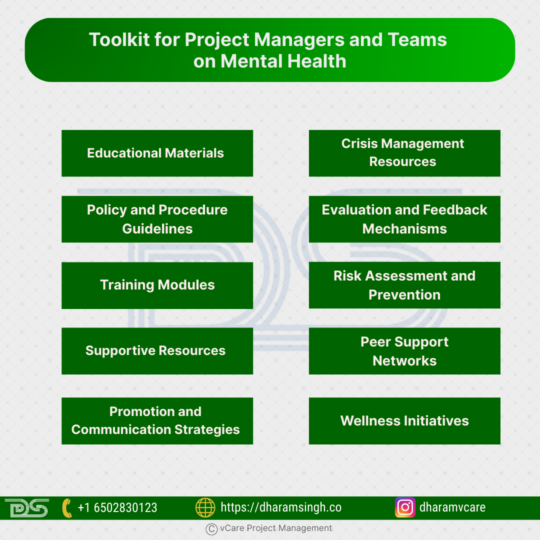
Equip your project team with the right tools. This mental health toolkit empowers leaders to build supportive, resilient, and high-performing workplaces.
1. Educational Materials: This document provides information on mental health disorders, workplace stigma reduction, stress management resources, resilience building, and self-care.
2. Policy and Procedure Guidelines: Sample policies for mental health support and accommodations, workplace crisis handling procedures, and guidelines for confidentiality and privacy regarding mental health issues.
3. Training Modules: Training sessions for managers and employees on mental health, communication skills, empathy, active listening, and promoting work-life balance are being conducted to prevent burnout.
4. Supportive Resources: This document provides contact information for mental health professionals, EAPs, helplines, referral pathways for counseling, therapy, or psychiatric services, and information on insurance coverage for mental health treatment.
5. Promotion and Communication Strategies: This document provides materials for raising mental health awareness, communication strategies for promoting initiatives, and platforms for sharing success stories, testimonials, and best practices within an organization.
6. Crisis Management Resources: This document provides protocols for handling workplace mental health emergencies, emergency contact information, and immediate support and follow-up care for employees in crisis.
7. Evaluation and Feedback Mechanisms: The toolkit involves surveys for feedback on mental health initiatives’ effectiveness, monitoring metrics like absenteeism and turnover rates, and regular reviews and updates to the toolkit based on feedback and organizational needs.
8. Risk Assessment and Prevention: This document provides tools for assessing workplace stressors, strategies for preventing bullying, harassment, and discrimination, and resources for promoting psychological safety and inclusion.
9. Peer Support Networks: The text suggests implementing peer support systems, training employees to offer mental health guidance, and promoting open discussions and forums for employees to discuss challenges and coping strategies.
10. Wellness Initiatives: Programs promoting physical activity, healthy eating, and sleep hygiene, as well as supportive work environments like flexible schedules and remote work options, are essential for a healthy lifestyle.
Real-world examples of organizations successfully addressing mental health
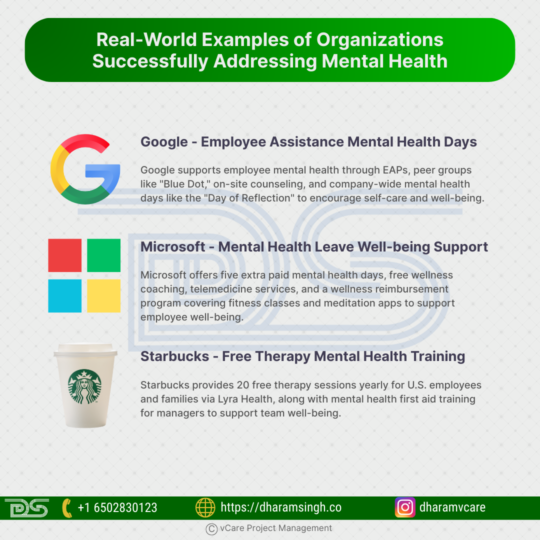
From Google to Nike—these 10 companies are redefining how workplace mental health is approached through proactive, supportive, and sustainable practices.
1. Google – Employee Assistance & Mental Health Days
Employee Assistance Programs (EAPs), peer support groups like “Blue Dot” where employees may openly discuss mental health concerns, and on-site counseling services are just a few of the mental health initiatives that Google has implemented. It also organizes company-wide mental health days, such as the “Day of Reflection,” to motivate staff to prioritize their health and take breaks.
2. Microsoft – Mental Health Leave & Well-being Support
In order to provide employees more time to concentrate on their mental health, Microsoft provides five extra paid mental health days annually. They offer free access to mental wellness coaching for employees and treatment via telemedicine services. Microsoft also offers a wellness reimbursement program that pays for things like exercise classes and meditation applications that promote mental and emotional well-being.
3. Unilever – Mental Health Champions & Flexible Work
Unilever has created a global network of Mental Health Champions, which consists of trained staff members who provide peer support and help create a psychologically safe workplace. They promote “agile working” as well, which enables employees to design flexible work schedules that accommodate their needs for both personal and mental well-being.
4. Deloitte – Mental Health Ambassadors & DE stigmatization Campaigns
Deloitte has taken the lead in addressing workplace mental health by appointing mental health champions and initiating awareness campaigns to reduce the stigma attached to discussing mental health. Their “This is Me” initiative encourages employees to submit personal stories regarding mental health in order to foster an open and supportive work environment.
5. Starbucks – Free Therapy & Mental Health Training
Through the Lyra Health platform, Starbucks offers 20 complimentary therapy sessions annually to all U.S. employees and their families. Additionally, the company provides shop managers with mental health first aid training, enabling them to identify symptoms of distress and provide team members with the right kind of assistance.
6. PwC (PricewaterhouseCoopers) – Mental Health Coaching & Well-being Apps
By providing subsidized therapy sessions and one-on-one mental health coaching, PwC has incorporated mental health into its overall well-being plan. Additionally, employees have access to applications for mental health like Headspace and Thrive, which offer stress-reduction techniques, mindfulness training, and guided meditation.
7. Accenture – Employee Assistance & Resilience Training
Comprehensive Employee Assistance Programs (EAPs) from Accenture include mindfulness training, round-the-clock counseling, and individualized mental resilience training. Additionally, they have a “Truly Human” campaign that highlights the value of mental health and self-care in a high-achieving workplace.
8. Johnson & Johnson – Holistic Mental Health Approach
With an emphasis on physical, emotional, mental, and spiritual well-being, Johnson & Johnson incorporates mental health into their “Energy for Performance” program. Employees have access to mental fitness training, on-site mental health counseling, and company-sponsored mindfulness and meditation programs.
9. Salesforce – Mindfulness Rooms & Employee Well-being Grants
Salesforce supports workplace mental health by providing employee well-being grants that enable staff members to receive financial assistance for mental health services like coaching, therapy, or wellness retreats, as well as by creating “Mindfulness Zones,” which are quiet areas in offices where staff members can meditate or take breaks.
10. Nike – Global Mental Health Training & Paid Rest Days
Nike started a program called “Mental Health First Aid” to teach employees and managers how to identify and handle mental health issues. In order to minimize burnout and promote mental recuperation, they also instituted paid rest days for the whole organization, such as a full week off for corporate workers.
Strategies for a Balanced Approach in Project Management
So, from all the real-world examples of organizations successfully addressing mental health, an effective project management is now crucial for businesses to keep ahead of the competition in the increasingly complicated and competitive business sector. The capacity to properly manage a project is crucial to its success, regardless of its size.
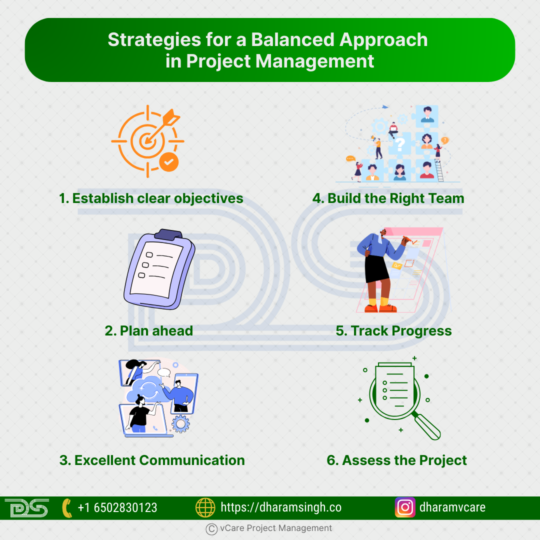
A successful project isn’t just about deadlines—it’s about clarity, teamwork, communication, and care. Here’s how to strike the right balance.
· Establish clear objectives: Having well-defined objectives is important for effective project management. Make sure that everyone engaged is aware of the project’s goals and that they are clearly defined.
· Plan ahead: Developing a strategy that details the actions necessary to accomplish your project’s objectives is the next stage. Create backup plans to deal with any obstacles that may arise. A project’s budget, schedule, and necessary resources should all be included in a solid plan.
· Excellent Communication: The keys to successful project management is excellent communication. Continually update all stakeholders on the status of the project and any modifications to its scope or schedule. Organize frequent check-ins or meetings to make sure everyone is in agreement.
· Build the Right Team: The team that works on a project has a big impact on its success. For each activity, make sure you have the appropriate individuals with the requisite training and expertise. Promote cooperation and teamwork to create a happy workplace.
· Track Progress: Monitoring progress is crucial to making sure the project is proceeding as planned and that objectives are being fulfilled. To monitor developments, spot any bottlenecks, and make necessary corrections, use project management software.
· Assess the Project: After the project is finished, spend some time assessing its effectiveness. Determine what needs to be improved, then make the necessary adjustments for next projects.
Conclusion
In project management, mental health is not only a primary issue, rather it is a critical component that affects team output, performance, and project success as a whole. The necessity for project managers to provide a supportive atmosphere where team members feel heard, respected, and capable of managing stress has been highlighted by the increased awareness of mental health issues in the workplace.
Project managers need to think about these important concerns in order to address these challenges:
· How to successfully strike a balance between team well-being and high performance standards in order to avoid burnout?
· What techniques may employ to foster a psychologically healthy workplace?
· What is the effect of emotional intelligence on a project manager’s capacity to encourage team morale and motivation?
· What part does risk management play in recognizing and reducing mental health risks?
· How to help teams who are dealing with unpredictability and short timelines become more resilient and adaptable?
The first step in addressing the influence of mental health on both individuals and teams in project management is to comprehend why it matters. Burnout, short deadlines, and a poor work-life balance are common issues that can lower morale and productivity. This emphasizes how important it is for project managers to foster an environment of open communication, psychological safety, and proactive assistance.
In order to enhance the well-being of team members, businesses need to put into practice useful tactics, such as mental health toolkits, organized support systems, and training courses that enable managers to identify and successfully handle mental health issues. Furthermore, a comprehensive strategy that incorporates flexible work arrangements, stress management programs, and practical project planning is needed to strike a balance between project needs and employee well-being.
Organizations have shown that prioritizing mental health initiatives leads to stronger teams and better project outcomes. By embedding mental health awareness into project management practices, organizations can create a healthier, sustainable work environment that benefits both employees and project success. Fostering a culture of mental well-being should be an integral part of the project leadership.
#ProjectManagement #MentalHealthAwareness #TeamWellbeing #BurnoutPrevention #LeadershipDevelopment #vCareProjectManagement #DharamSingh #PMICertification #ProjectSuccess #EmployeeSupport #WorkplaceWellness #LeadershipMatters #HealthyTeams #MentalHealthToolkit #EmotionalIntelligence #FlexibleWork #CorporateCulture #StressManagement #ProjectLeadership #WellbeingAtWork

by DharamCW | May 19, 2025 | Professional Development Webinars, Professional Resilience and Inspiration Stories
🚀 Excited to Host an Exclusive Webinar with Tetyana Gabalis! 🎙️
Join me and vCare Project Management on Friday, May 23, 2025, for a powerful session featuring Tetyana Gabalis, a distinguished EPMO Delivery Manager from Ottawa, Canada. With over two decades of experience in financial services, high-tech industries, international transportation, manufacturing, and IT consulting, Tetyana has successfully led complex, high-stakes programs and portfolios, delivering measurable value in regulated and dynamic environments.
🔗 Register Now → https://bit.ly/3EFV4O9
🗓 Date: Friday, May 23, 2025
⏰ Time Zones:
08:00 AM – 09:00 AM (PDT) / 09:00 AM – 10:00 AM (MDT) / 10:00 AM – 11:00 AM (CDT) / 11:00 AM – 12:00 PM (EDT) / 12:00 PM – 01:00 PM (BRT) / 05:00 PM – 06:00 PM (CEST) / 06:00 PM – 07:00 PM (AST) / 07:00 PM – 08:00 PM (GST) / 08:30 PM – 09:30 PM (IST)
🎯What You’ll Gain from This Webinar:
– Strategic Alignment in a Regulated Environment
– Evolving from Traditional Project Management to EPMO
– Embedding Change Management in Delivery
– Influencing Without Authority
– Using Data to Drive Portfolio Performance
🎓 Earn 1 PDU
🎁 Special Discounts on upcoming PMP, PgMP & PfMP programs
💬 Book a 1-on-1 call with me: http://talktodharam.com
📌 Explore More:
PfMP Online Training → http://bit.ly/39jOZSf
PfMP Direct Training → http://bit.ly/38er2M3
PfMP4U LinkedIn Group → http://bit.ly/31P7GKR
Let’s unlock the value of strategic execution together. Looking forward to seeing you there!
#PfMP #PfMPTraining #PortfolioManagement #PfMPExamPrep #ProjectManagement #PMICertification #PfMPMentoring #vCareProjectManagement #DharamSingh #PMI #PMIATP #PfMP2025 #PortfolioManager #StrategicExecution #MentorshipMatters #LeadershipDevelopment #OnlineTraining #ProfessionalGrowth #PfMPCertification #PfMPBootcamp

by DharamCW | Mar 22, 2025 | PMI Certification Success Stories, Professional Resilience and Inspiration Stories
🌟 Program Management Professional (PgMP) Success Stories | Dec 2024 – Mar 2025 🌍
🚀 A Global Celebration of Excellence!
A huge congratulations to the newest PgMP® certified professionals who achieved this prestigious milestone between December 2024 and March 2025 with vCare Project Management! 🎉
📌 A Proud Milestone:
Since our inception, we have been honored to mentor and guide 541 professionals across 57 countries toward their PgMP® success. This achievement reflects the dedication, resilience, and strategic mindset required to excel in program management at the highest level.
🌍 PgMP® Global Landscape (as of Feb 28, 2024):
✅ Approx. 7,900 Active PgMPs worldwide
✅ Top Countries: China, North America, MENA, Asia Pacific, South Asia, Europe, Latin America

541 professionals across 57 countries have now joined the PgMP elite with vCare Project Management. Discover their stories and start your own.
🔥 What’s Next for You?
📌 Are you ready to join this elite league of program managers?
📌 Looking for expert guidance on the PgMP® application, preparation, or exam strategy?
Let’s talk! Obligation-free consultation session using http://talktodharam.com, and let’s shape your PgMP® success story together!
View our upcoming PgMP Programs
Online – http://bit.ly/2oBKQXQ
Direct – http://bit.ly/2oCfpg0
Join our PgMP4U LinkedIn Group for the latest updates – http://bit.ly/2SBPwIp
Explore our useful PgMP Study Materials:
Complete Reference Guide for PgMP Certification | 6th Edition – https://bit.ly/3gsEkKj
PgMP Pathfinder | PgMP Mind Maps based Examination Content Outline – https://bit.ly/3pLkazn
The Standard for Program Management | Fifth Edition – https://bit.ly/43lqq4I
PgMP Challenger Gold (Mock Exams 1 to 5) | Exam Simulator – https://bit.ly/3NGrysU
PgMP Challenger Silver (Mock Exams 1 to 3) | Exam Simulator – https://bit.ly/44rOIKY
PgMP Challenger Mock Exam 1 | Exam Simulator – https://bit.ly/2RMmMAk
PgMP Challenger Mock Exam 2 | Exam Simulator – https://bit.ly/3Urs7JA
PgMP Challenger Mock Exam 3 | Exam Simulator – https://bit.ly/3JM9afX
For more insights into program management certification, training, and career development, book a personalized, obligation-free consultation session using http://talktodharam.com
Looking to deepen your knowledge? Check out our upcoming webinars featuring global experts,
1. Strategic Leadership & Operational Excellence, featuring Jay Brough – https://bit.ly/41sSraX
2. Influencing Organizational Culture, featuring Jeffery Porter – https://bit.ly/4ifsEsy
Success isn’t a destination—it’s a journey. Keep pushing boundaries, and let’s lead the future of program management together.
#vCarePgMP #PgMPsuccess #DharamSingh #ProgramManagement #Leadership #PMI #CareerGrowth #PgMPmilestone #PgMPjourney #vCareProjectManagement

by admin | Jan 10, 2025 | Professional Resilience and Inspiration Stories
Impostor syndrome is a psychological disorder where individuals mistrust their abilities, leading to decreased productivity, increased stress, anxiety, and work satisfaction. IT project managers often experience this issue, distrusting their team’s communication, leadership, and decision-making abilities.
This article explores the causes of impostor syndrome in project management, its psychological and professional impact, and actionable strategies to overcome it.
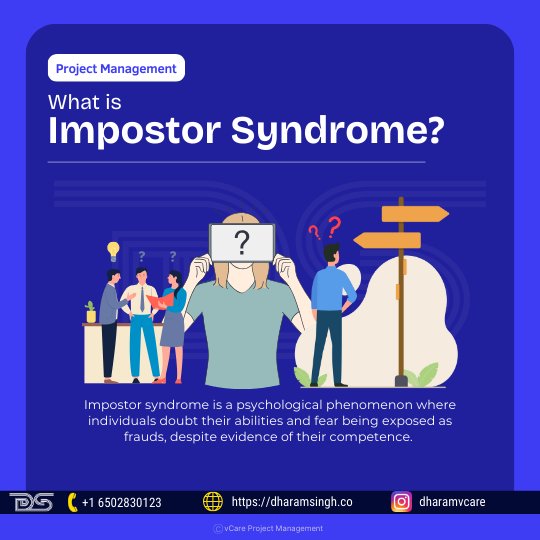
What is Impostor syndrome?
Project management awareness of Impostor syndrome
Project managers frequently feel like frauds, despite their accomplishments. The impostor syndrome causes people to distrust themselves. They’re worried about disappointing their teammates. It stems from the high expectations in project management. The term “impostor syndrome” was coined by Pauline Clance and Suzanne Imes, to describe chronic self-doubt, dread of failure, and the conviction that achievement is due to luck or fortunate timing. It is a major professional difficulty in project management, affecting performance, decision-making, and team relations.
A KPMG: Women’s Leadership study found that 75% of female executives experienced impostor syndrome, with project managers being particularly vulnerable.
Why It Matters in Project, Program, and Portfolio Management
Project, program, and portfolio managers are important to the performance of organizations, which makes impostor syndrome crucial. It is concerned with making certain that strategic projects are properly carried out and completed effectively, on schedule, and within budget. These professionals’ roles typically expose them to scrutiny from team members, senior leadership, and stakeholders; as a result, self-doubt can have disastrous consequences.
General reasons why the impostor syndrome is important in this discipline include:
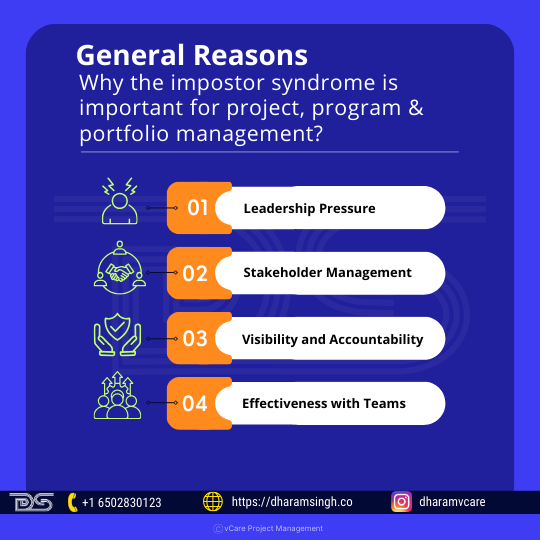
General reasons why the impostor syndrome is important Project, Program, and Portfolio Management?
- Leadership Pressure: The managers of a project are considered decision-makers and problem solvers. Hesitation and loss of confidence can undermine leadership authority and destroy team trust.
- Stakeholder Management: Stakeholder management requires assertive communication about managing expectations from clients, sponsors, and cross-functional teams. Impostor syndrome creates second-guessing abilities to meet the expectations of stakeholders.
- Visibility and accountability: Project managers function under very visible conditions that exhibit success and failure intensely, and the more successful one of these projects is, the further it raises the reputation, or the worse, failing it may attract public attention in creating self-doubting notions.
- Effectiveness with Teams: The inadequacies of a project manager have a ripple effect on those teams, thus influencing their confidence and productivity.
Identifying Its Challenges in High-Stakes Situations
The high stakes of project management provide the perfect breeding ground for impostor syndrome. Here’s why:
- Project Managers’ Multifaceted Function
A project manager can serve a range of roles, including leader, planner, communicator, mediator, and risk management. Even professionals may feel inadequate at times due to the diversity of roles.
- Fast-paced and Changing Work Environments
The project management field evolves with new methodologies such as Agile, Lean, and Six Sigma, tools, and technologies. In this setting, one cannot keep up to date, and in the attempt to transition from traditional ways of handling project management, one is always left inadequate. Fast-paced changes in priorities with very short deadlines don’t help as well and just amplify self-doubt by squeezing little time for error.
- The Need for Perfectionism
Usually, project managers fall prey to the pressure of being perfect and over prepare or fear delegation. Perfection emerges because he believes that if he fails, everyone else will expose his ineptness.
- Cultural and Gender Dynamics
Cultural expectations, such as respect for authority or not wanting to boast, can heighten impostor syndrome. In some cultures, voicing doubts or seeking assistance is perceived as a sign of weakness. Women and minorities in project management positions experience impostor syndrome more keenly because of systemic biases and underrepresentation in leadership roles.
- Dynamic Stakeholder Relationships
It is particularly difficult to manage relationships with stakeholders that have divergent expectations or interests. The urge to constantly “prove themselves” is a common one among project managers, particularly in politically heated workplaces.
Signs of Impostor Syndrome in Project Managers
- Deny receiving compliments or explain success away using outside reasons.
- Desperation to prove one’s work: This involves seeking self-validation through peer or third parties’ validation.
- They avoid risky tasks or roles/positions.
- Work overtime or exert excessive efforts just to correct imagined deficiencies.
- Successes occurred by chance or good fortune.
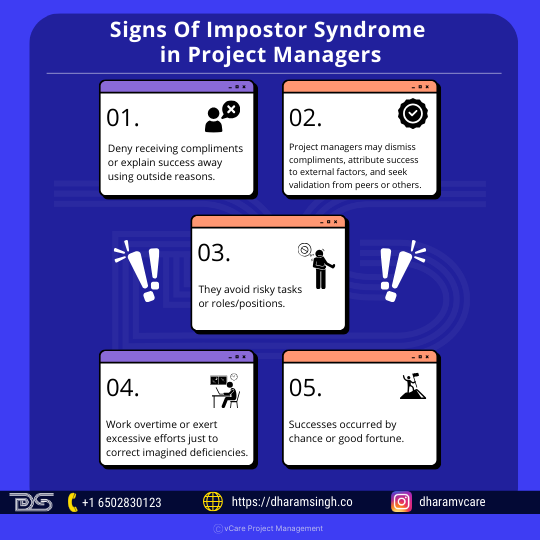
Signs of Impostor Syndrome in Project Managers
Once such understanding is gained about the nature of impostor syndrome and the specific challenges it brings in project management, it would be easier for professionals to take the first step toward resolution. Identifying such feelings early and acknowledging the fact that many people experience them will help lay the foundation for self-doubt and building confidence in their roles.
The Psychological Toll: Emotional and Professional Impacts
Impostor syndrome can significantly affect the psychological well-being and performance at work of project managers. The fear of being exposed as incompetent despite evidence to the contrary leads to the perpetuation of self-doubting, overcompensating, and eventually burnout. It is, therefore, essential to understand in detail the impacts that may lead to addressing the challenges imposed by impostor syndrome.
Psychological Effects of Impostor Syndrome
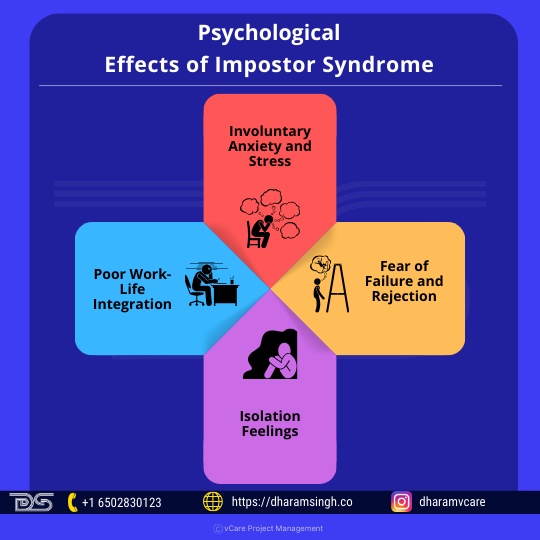
Psychological Effects of Impostor Syndrome
- Involuntary Anxiety and Stress
Continuous fear of failure and “being caught out” will also often create chronic anxiety. Project managers may obsessively worry over meeting the time deadlines, pleasing the stakeholders, or dealing with any other emergent obstacles.
Such higher levels of stress may also manifest in the body. They could be plagued with insomnia, headaches, and even more fatigue which lowers their ability to perform.
- Fear of Failure and Rejection
Most project managers with impostor syndrome fear taking risks or presenting new solutions because those might get them wrong. This often hinders creativity and prevents full potential use and, thus, often leads to missed opportunities for growth at both the personal and team levels.
- Isolation Feelings
Impostor syndrome patients generally feel lonely. They might think that others and even their superiors are much better and more confident, which generally proves to be wrong. Such isolation may lower the level of motivation to ask for help or to share responsibility and thereby intensify the pressure on them.
- Poor Work-Life Integration
Many project managers end up suffering from poor work-life integration by working long hours due to the urge to prove themselves. Poor relationships with personal lives may lead to this integration and even decrease job satisfaction. It turns out to be a vicious cycle of dissatisfaction and self-doubt.
Professional Outcomes of Impostor Syndrome
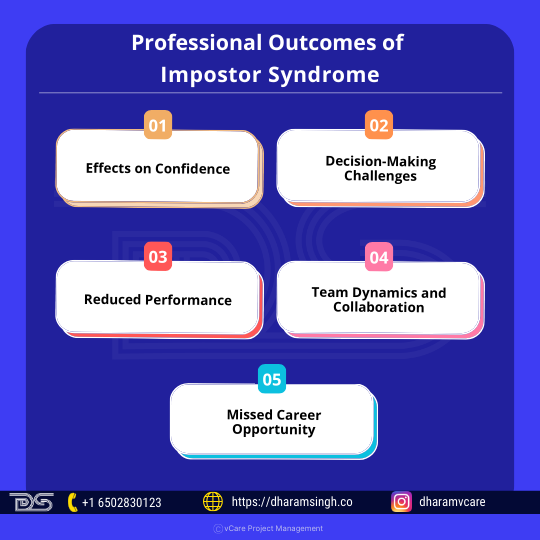
Professional Outcomes of Impostor Syndrome
- Effects on Confidence
Impostor syndrome consumes self-confidence because the project managers start doubting their decisions. For example, they may not advance new ideas in meetings, or they may deny getting credit for the success. Lack of confidence also makes leadership hard to achieve because other team members look up for direction and reassurance to their manager.
- Decision-Making Challenges
Decision paralysis is often the result of the fear of making mistakes. Project managers may delay critical decisions, seeking excessive validation or overanalyzing data to avoid potential criticism. Alternatively, they may make overly cautious decisions that limit the project’s potential, prioritizing “safe” outcomes over innovative solutions.
- Reduced Performance
Over-preparation and perfectionism, which are prominent signs of impostor syndrome, can deplete time and energy that could be better spent on strategic goals. For example, a project manager may spend hours preparing a presentation slide rather than addressing a serious resource allocation issue.
- Team Dynamics and Collaboration
Impostor syndrome can damage team trust and morale. When project managers fail to distribute duties because they lack confidence in their leadership, team members may experience micromanagement, inefficiency, and frustration. Too critical of themselves as managers create impossible goals for a team. Pressure is also unnecessary and not productive.
- Missed Career Opportunity
Those affected by impostor syndrome feel incapable of becoming leaders or take risky projects where they would appear less prepared, or they were not competent enough. The career of such a person will reach a stagnating state, while their profile is dropped lower in an organization than deserved; they already have all the skills and expertise.
To break out of the emotional and professional impacts of impostor syndrome, project managers can use strategies that include:
- Become more mindful of yourself: Recognize and acknowledge the existence of impostor syndrome symptoms.
- Reframe negative thoughts: Adopt a development attitude, which views failures as teaching opportunities, in place of a self-doubting perspective.
- Seek mentorship: Spend time with mentors or peers who could guide, support, and give critical feedback.
- Celebrating Achievements: Find time to reflect on and appreciate successes regardless of the magnitude.
Addressing the emotional and professional toll of impostor syndrome in project managers can only make the manager perform better while building healthier, more productive team dynamics. Recognizing self-doubt as an ordinary rather than failing on personal levels is the first step toward overcoming its effects.
Root Causes: Triggers in High-Stakes Environments
Impostor syndrome seems to come out of the blue. It is often caused by characteristics prevalent in competitive situations such as project, program, and portfolio management. The factors that lead to these triggers shed light on why impostor syndrome occurs and how it can be effectively managed.
Factors that contribute to impostor syndrome in highly competitive industries
- High expectations and pressure to perform
Highly competitive industries require a high level of performance under time pressure and innovation. Project managers are often faced with strict performance requirements that leave no room for error.
- Technological aspects
In areas such as technology or finance, the increasing need to keep up with the latest tools, trends, and methods threatens even experienced professionals with obsolescence and under-qualification.
- Complexity of stakeholder relationships
The need to oversee multiple stakeholders with conflicting interests exacerbates this problem. To win over stakeholders, project managers often have to “prove” themselves repeatedly.
This problem is particularly prevalent in matrix organizations where project managers need to communicate simultaneously with senior executives, cross-functional teams, and external suppliers.
- Stereotypes and systemic biases
Women, minorities, and other disadvantaged groups in leadership positions may find it more difficult to overcome impostor syndrome due to systemic biases and preconceived conceptions.
- Cultural norms
In certain cultures, humility and respect for authority are more important than self-promotion. Individuals from these backgrounds may struggle to accept their accomplishments, leading to feelings of inadequacy.
How organizational culture and dynamics exacerbate Impostor Syndrome?
- Lack of recognition and feedback
In organizations where there is little recognition of success or feedback, project managers can begin to question their usefulness and competence. A culture where only performance is measured and not individual contribution can lead to employees becoming replaceable parts rather than valued team members.
- Unhealthy competitiveness
An overly competitive environment encourages individuals to compete with and even against their peers, fostering a zero-sum worldview. In cases where promotions or bonuses are limited, the pressure to outperform others leads to anxiety and self-doubt about one’s abilities.
- Toxic leadership qualities
Leaders who micromanage, overly criticize, or fail to support their teams create a culture of fear and uncertainty. A project manager working in such a scenario feels that everything they do is being watched, which increases their fear of making mistakes.
- Undefined roles
Unclear roles and responsibilities can lead to impostor syndrome. For example, if expectations are not defined, professionals may feel unqualified even though they perform well. A project manager who is also entrusted with technical tasks without receiving appropriate training may feel inadequate in his or her management skills, even though he or she manages well.
- The emphasis on perfectionism
Organizations that reward perfection and punish mistakes create a culture where mistakes are feared. Project managers would overwork themselves or be afraid to let go because they feel that any mistake would affect their performance.
Real-world example: impact of organizational culture
- Scenario: A company transitioning to agile methods puts a lot of pressure on its managers to adapt quickly and deliver fast.
- Trigger: Most training courses offer little practical support or mentoring to prepare project managers for these tasks.
- Result: Many managers feel unable to lead agile teams, despite having relevant knowledge and experience from traditional project management.
- Exacerbation: Poor, unhelpful early iterations offer little constructive feedback and perpetuate these feelings, often increasing stress and reducing productivity.
When the company introduced a coaching system with continuous guidance from experienced Agile practitioners, managers gained more confidence in their roles, and project results improved.
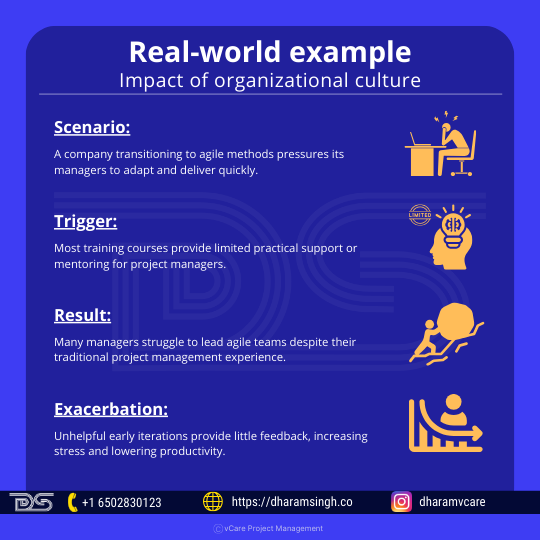
Real-world example: impact of organizational culture
Overcoming the triggers
Organizations and individuals can overcome these triggers by creating a supportive and inclusive environment:
- Encourage continuous learning
Set up training programs and professional development activities to help project managers learn the ever-changing needs of the industry.
- Recognition and feedback
This can be encouraged through a culture of regular constructive feedback and celebration of individual and team achievements.
- Develop an inclusive leadership culture:
Leaders need to be trained to make teams feel safe, heard, and valued.
- Roles and expectations
Ensure that project leaders know what is expected of them and how many resources they have at their disposal.
- Redefining failure
Change the organization’s mindset by no longer viewing failure as a symbol of weakness but as an opportunity to learn.
This understanding of the origin of impostor syndrome in a pressured setting benefits the organization. They can assist project managers overcome self-doubt, but they also foster a culture of resilience, innovation, and collaboration.
Striking the Balance: Confidence and a Growth Mindset
Project managers who struggle with impostor syndrome must strike a balance between confidence and a growth mindset. A growth mindset promotes ongoing learning and development, while confidence gives you the certainty to act. Professionals can embrace difficulties, grow from failures, and perform well under pressure when these qualities are combined.
Fostering a Growth Mindset While Maintaining Confidence
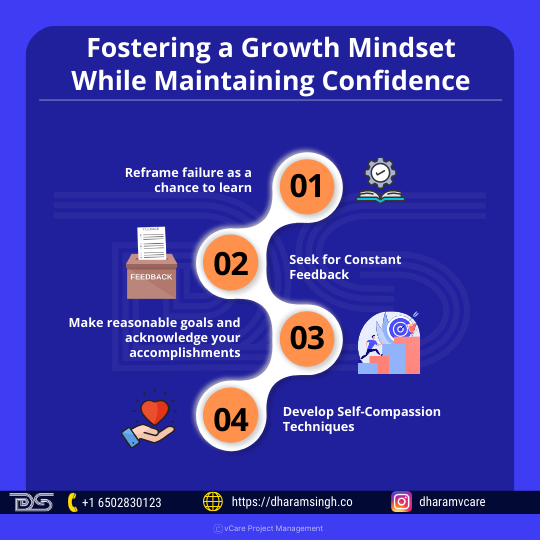
Fostering a Growth Mindset While Maintaining Confidence
- Reframe failure as a chance to learn
A growth mindset considers challenges and failures as opportunities for progress. Team members and leaders may help normalize failure by examining what went wrong and using it to guide future choices. For instance, instead of concentrating only on bad results, project managers might emphasize lessons learned from mistakes during post-project reviews.
- Seek for Constant Feedback
Frequent feedback promotes progress by pointing out blind spots and areas that need work. However, positive reinforcement increases self-esteem by recognizing achievements.
Establish organized feedback loops in teams, such as 360-degree reviews or weekly check-ins, to balance appreciation and constructive criticism.
- Make reasonable goals and acknowledge your accomplishments
Confidence can be damaged by unrealistic goals, particularly when they don’t yield the desired outcomes. Establishing modest objectives gives one a sense of achievement and increases self-confidence. For example: Break major project goals into more manageable, quantifiable tasks, then celebrate when they are finished.
- Develop Self-Compassion Techniques
People who suffer from impostor syndrome frequently criticize themselves severely. A kinder, more encouraging approach to personal growth is made possible by engaging in self-compassion practices.
To combat negative self-talk and keep perspective on failures, employ mindfulness techniques or affirmations.
Turning Impostor Syndrome into a Driver for Improvement
- Recognize Inspiring Impostor Thoughts
Instead of stifling self-doubt, take it as a lesson to be well-prepared and to aim for perfection. For instance, a project manager can focus their efforts on learning more, improving their skills, or looking for mentoring if they feel unqualified for a position.
- Prioritize learning and effort above results
The process is more important to a growth mindset than the outcome. Fear of failure declines when attention is directed toward one’s work and growth. For instance, a manager might concentrate on how much their team has developed or changed over the project rather than focusing on achieving all KPIs.
- Stress Collaborative Development
Project managers may establish cooperative, encouraging workplaces by cultivating empathy for others’ hardships through impostor syndrome. To build trust and promote group problem-solving, share personal experiences of uncertainty with team members.
- Take on Perfectionism
Impostor syndrome is significantly influenced by perfectionism. Professionals can achieve more sustained growth by adopting a “progress over perfection” mindset instead of a “perfect or bust” one. For example: To feel successful, celebrate small achievements along the way rather than waiting for a perfect end product.
Balancing confidence with a growth attitude enables project managers to change impostor syndrome from a limiting understanding to a success driver. Organizations may help individuals reach their full potential by creating a supportive culture that promotes development, learning, and empathy.
Real-World Insights: Overcoming Impostor Syndrome
Important things to know about project management tend to come out when doing the job. Impostor phenomenon as it is known does seem to fit the bill of an occupational hazard. Project managers at times end up working at cross purposes when they want to comply with expectations. This is all driven by a deep-seated belief that does not recognize that it is normal to have uncertainties and that a project manager has to have a complete understanding of every situation.
To manage project management impostor syndrome, it is suggested to raise the level of self-awareness, use ideas from the group, view themselves as team buffered, and appreciate learning. In the course of project management, there has to be an inherent contradiction between having confidence in the outcome and being modest, as well as being accepting, being prepared to learn, and pointing out achievement. This in the end builds trust and corrects behaviour in such a way that encourages rather than alienates others.
Project managers may prevent impostor syndrome by adopting a growth mindset, which allows them to refine their risk management strategy and see mistakes as opportunities for learning. One can be confident that self-doubt is a normal occurrence by networking with other project managers through organizations like the Project Management Institute. Acknowledging achievements builds confidence and momentum. Overcoming impostor syndrome is a continuous process of discovery of oneself and growth that transforms the condition into a chance for resilience and confidence.
Success Stories: Professionals Who Overcame Impostor Syndrome
Impostor syndrome is a common thing among successful people, a feeling that their achievements were not merited and they got lucky instead of being brilliant. However, many of them have defeated this insecurity and rocked their careers.
- Sheryl Sandberg – American technology executive, philanthropist, and writer
Sandberg overcame impostor syndrome by opening up about her feelings, seeking support from mentors, and taking on new challenges.
- Maya Angelou – American memoirist, poet, and civil rights activist
The poet and activist reminded herself of her worth and contributions to combat impostor syndrome. She wrote about her struggles in her autobiographies.
- Howard Schultz – American businessman and author
Schultz embraced failure as a learning opportunity, the former CEO of Starbucks.
- Runali Maniya, SDG Impactors Founder and Master of Business alumnus
The business owner started SDG Impactors, a t-shirt brand that promotes the Sustainable Development Goals of the UN. She encourages others to persevere and be strong.
- Katie Padgett Brown – Dance Educator
The artist and educator believes that overcoming impostor syndrome is a continual challenge.
- Nam Ahuja – The Senior Practice Manager at CDW
She found that being curious, asking questions, and listening helped her put aside insecurities.
Impostor syndrome is a thought pattern where someone has a persistent fear of being exposed as a fraud. It can make people doubt or minimize their accomplishments.
Lessons from Addressing Self-Doubt in Challenging Projects
Real-world projects can involve a great deal of pressure, especially when the risks are high. Impostor syndrome thrives in such environments. However, experts have offered transforming insights from their experiences.
Impostor Syndrome in Real-World Projects
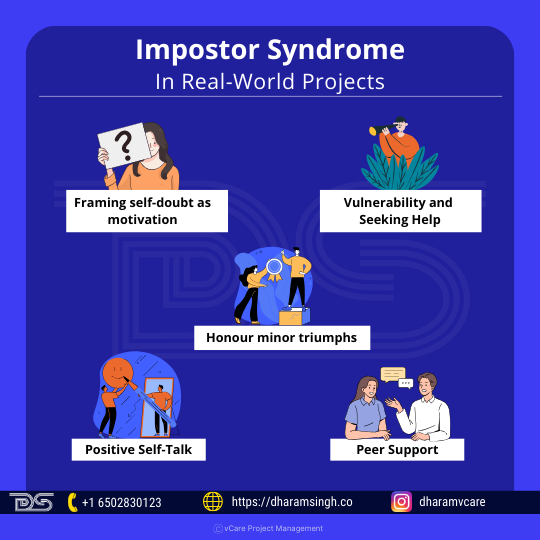
Impostor Syndrome in Real-World Projects
- Framing self-doubt as motivation: Using one’s self-doubt to increase motivation for job performance and preparation.
- Vulnerability and Seeking Help: Seek help in changing the story of impostor syndrome.
- Honour minor triumphs: Divide large objectives into small steps to promote steady progress and self-assurance.
- Positive Self-Talk: Transitioning from self-deprecation to self-support.
- Peer Support: You can become less isolated and more understanding by speaking with others who have gone through the same thing.
Key Tactics for Overcoming Impostor Syndrome
- Recognize and categorize thoughts to detect impostor syndrome.
- Maintain a success journal to document accomplishments.
- Reframe failure as learning opportunities.
- Establish a growth mindset to shift from fixed to improvement-oriented.
- Seek mentorship for insight, encouragement, and constructive criticism.
Cultivating Resilience: The ‘Refuse to Lose’ Mentality
One of the most sought-after and essential traits in the fast-paced workplace of today is resilience. Professional competence in showcasing quicker adaption results in “refusing to lose” mindset in the face of adversity. Resilience is often top-driven with intentional and persistent efforts and the organization’s culture in accepting the change to sustain and overcome hurdles while focusing on long-term success.
The “refuse to lose” mentality implies an unwavering will to achieve one’s goals despite setbacks. It is distinguished by a mindset that sees problems as chances for progress and failures as temporary obstacles rather than insurmountable barriers. This mentality does not mean a steadfast rejection to accept failure, but rather a reluctance to let it define one’s journey. People with this mindset use a proactive, problem-solving attitude, modifying their techniques while remaining focused on their goals. This approach is crucial for professionals in leadership positions including project managers, entrepreneurs, and team leaders. It builds confidence, motivates teamwork, and allows people to manage challenging circumstances with clarity and resolve.
Developing a Resilient Mindset
- Accept failure as a learning experience
Resilience individuals view failure as a learning opportunity, reducing anxiety and promoting continuous progress, thereby transforming it into a stepping stone for success.
- Practice emotional regulation
Emotions need to be handled in a professional manner under stressful conditions. Identifying, understanding, and controlling emotions to respond positively is the essence of emotional regulation. For example, a leader confronted with a project delay may first experience annoyance or fear. Instead of responding impulsively, individuals might pause, analyze the circumstance, and take sensible action to resolve the problem. This calm approach not only helps to address problems but also sets a good example for the team.
- Concentrate on incremental progress
Breaking down big goals into smaller, easier-to-accomplish chores might help you feel more in control. This method generates momentum and confidence, allowing individuals and teams to concentrate on making steady progress. For example, a team working on a large-scale product launch might establish goals for each phase and celebrate little success along the way. Incremental achievement fosters the idea that the final objective is feasible.
- Create a Reliable Support Network
A strong support system can frequently help to boost resilience. It is essential to surround oneself with coworkers, mentors, or peers who can offer direction, support, and critical comments. When leaders encourage cooperation and support among their teams, they create an environment in which resilience becomes a common value. For example, an organization founder experiencing financial issues may seek strategic assistance from their advisory board, building on their aggregate knowledge and expertise.
- Adopt a growth mindset
Professional competence with experience, is essential for fostering resilience. This mentality encourages people to see problems as chances to learn new abilities and maximize their potential. Leaders with a growth mentality encourage their staff to accept change, take measured chances, and innovate even in uncertain situations.
Inspiring Teams Through Resilience
- Manage with transparency and optimism
Resilient leaders motivate their people by combining openness about obstacles with optimism about solutions. Acknowledging obstacles but remaining confident in the team’s capacity to overcome them fosters trust and drive. For example, a project manager handling resource limits may openly address the situation with their team while showing faith in their team’s ability to solve problems together. This strategy enables the team to face difficulties straight on.
- Promote a solutions-oriented culture
A solutions-oriented culture encourages teams to consider potential rather than problems. Leaders may help their teams explore new ways and cooperate to overcome problems. For example, a logistics team dealing with supply chain problems can collaborate to find alternate suppliers or adapt delivery timetables. This method guarantees that obstacles are faced with proactive problem solutions rather than defeatism.
- Empower team members
Empowering team members to take ownership of their roles promotes responsibility and confidence. When people feel trusted to make decisions and contribute to solutions, they are more inclined to face obstacles with grit. For example, a leader who delegates decision-making authority to their team amid a crisis not only fosters trust, but also enhances the team’s capacity to adapt and persist.
- Acknowledge Success and Effort
Acknowledging minor accomplishments boosts perseverance and self-confidence. Celebrating success requires praising effort and commitment, and a team feeling valued is more likely to remain resilient and motivated amidst problems.
Resilience’s Impact on Long-Term Achievement
Resilience in the face of hardship is all about limiting the damage and being able to swiftly resume routine. Long-term success in any field requires a culture of change acceptance, which resilience promotes.
Resilience as a Path to Success
Cultivating a “refuse to lose” mindset is critical for overcoming challenges and establishing lasting success. Individuals may acquire the resilience required to confidently manage obstacles by viewing failure as a learning opportunity, exercising emotional regulation, and having a growth attitude. Leaders who exemplify and promote resilience motivate their colleagues to continue, creating an environment of hope and resolve. Finally, resilience is not about avoiding obstacles, but about growing stronger with each one, ensuring that neither individuals nor teams lose sight of their ability to achieve.
Authenticity over Pretence: Beyond ‘Fake It till You Make It’
The “fake it till you make it” tactic, on the other hand, creates short-term confidence under challenging conditions but has long-term risks. In contrast, the “original” method makes one rely on long-term confidence and trust and gives the same person effective leadership. The strategy is better compared to the latter for counteracting impostor syndrome.
Examining the Limitations of ‘Fake It Till You Make It’
- Superficial Confidence and Emotional Burnout
“Faking it” frequently results in a reliance on external validation rather than actual self-confidence. Over time, the strain to maintain a front can lead to emotional depletion and worsen impostor syndrome.
According to Frontiers on Burnout and Remote Work Stress study published in Psychological Bulletin, hiding actual sentiments or actions to fit into work situations frequently leads to stress and poor job satisfaction.
- Loss of trust in leadership
Leaders who use a “fake it” strategy may fail to develop true relationships with their employees. Trust is the foundation of effective leadership, and perceived inauthenticity can undermine trust. According to Harvard Business Review study: How Transparent Should You Be with Your Team, employees are more inclined to interact with executives who are vulnerable and transparent than those who are too polished or fake.
- Missed Opportunity for Growth
Pretending to know everything may prevent people from seeking help or realizing that they need to improve, which will hinder personal and professional development. A Forbes study on leadership characteristics found that knowledge gaps encourage collaborative problem-solving and foster a culture of continuous learning.
Promoting Authenticity as a Key to Sustainable Leadership

Promoting Authenticity as a Key to Sustainable Leadership
- Encouraging vulnerability
Authentic leaders are open about their shortcomings and share their learning processes with their people. Vulnerability humanizes leaders, resulting in stronger ties and greater respect.
- Self-awareness
Professionals can improve their self-understanding through strategies such as self-reflection or 360-degree feedback, which require self-awareness and acceptance of both personal strengths and weaknesses.
- Developing Confidence Through Mastery, Not Pretence
Authentic confidence is generated via technical mastery and actual successes, not a superficial display of ability. This method guarantees that confidence remains resilient under pressure.
- Promoting Open Dialogue in Teams
Leaders who value authenticity may encourage their people to communicate ideas and concerns without fear of being judged. This fosters a culture of psychological safety, increasing creativity and productivity.
While “fake it till you make it” might provide brief comfort from self-doubt, its drawbacks frequently exceed its advantages. Authenticity, from awareness and vulnerability to honest self-confidence, is much better support for sustainable growth into professionals and effective leaders. A leader who owns his true identity also eliminates impostor syndrome in his life and inspires their teammates with trust, loyalty, and innovation.
The Silver Lining: Impostor Syndrome and Team Dynamics
Unexpected advantages that may enhance workplace dynamics are offered by impostor syndrome, though it is frequently perceived as an unpleasant experience. For individuals suffering from impostor syndrome, interpersonal connections can be improved and contributory roles to cohesive, high-performing teams can be accomplished through the cultivation of self-awareness, empathy, and a collaborative mentality. This viewpoint changes the narrative, emphasizing how impostor qualities may generate unique chances for team growth and success.
How Impostor Syndrome Promotes Collaboration and Empathy?
- Increased Empathy by Sharing Vulnerabilities
Individuals suffering from impostor syndrome are frequently acutely aware of their hardships, which makes them more sympathetic to the difficulties of others. This increased sensitivity promotes a friendly workplace atmosphere.
According to Frontiers: Organizational Psychology, leaders who freely admitted their fears were more likely to foster trust and boost team morale. Teams led by compassionate people expressed greater levels of pleasure and engagement.
- Promoting Inclusion and Diverse Perspectives
Impostor syndrome can make people more open to comments and suggestions from their coworkers. This transparency promotes inclusion and different contributions within teams. McKinsey & Company study on Psychological Safety shows that psychological safety, which is typically associated with empathy and vulnerability, has a favorable influence on innovation and problem-solving in diverse teams.
- Developing a Culture of Continuous Learning
People with impostor syndrome frequently want to improve themselves via continual learning. When incorporated into teams, this approach may foster a culture of self-improvement and skill development.
According to a Harvard Business Review article on “Growth Mindset”, leaders who embrace a growth mindset inspire their staff to follow accordingly, resulting in long-term team success.
Using Empathy and Collaboration for Team Cohesion
- Establishing Psychological Safety
A culture where expressing self-doubt is viewed as a learning opportunity rather than a sign of weakness may be established by team members and leaders.
- Promoting cooperative problem-solving techniques
Self-doubt is the characteristic aspect of impostor syndrome, driving people to seek feedback from others frequently. This can naturally result in more collaborative problem-solving and sound decision-making being made.
- Creating stronger team bonds
Shared experiences with impostor syndrome can bring team members closer together and promote unity. Teams that bond over common struggles are frequently more cohesive and resilient.
Impostor syndrome, while hard, provides unique chances to improve workplace relationships via enhanced empathy, collaboration, and a desire to learn. Leaders may use psychological safety to establish cohesive and resilient teams. Turning impostor syndrome’s perceived “weakness” into a strength benefits both people and the company as a whole.
Support Systems: Mentorship, Leadership, and Organizational Roles
Impostor syndrome thrives in circumstances that lack proper support, making mentorship and leadership critical in resolving this common issue. Organizations that use defined frameworks to actively foster confidence and progress might turn impostor syndrome into a professional development opportunity.
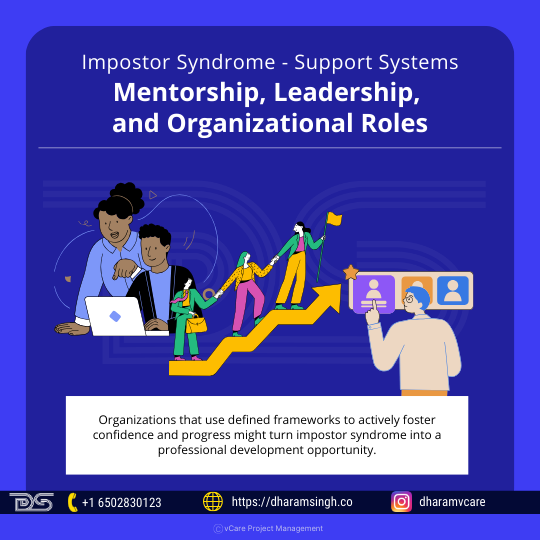
Impostor Syndrome – Support Systems: Mentorship, Leadership, and Organizational Roles
The role of mentorship and leadership
- Assistance with mentoring as a catalyst for confidence
Mentors provide a secure environment for mentees to discuss their fears and acquire perspective.
The Harvard Business Review emphasizes the value of mentors who aggressively confront negative self-talk and assist mentees in recognizing their accomplishments.
- Leadership Styles That Prevent Impostor Syndrome
Transformational leaders, who inspire and motivate by creating psychological safety, are very good at addressing impostor syndrome.
Developing organizational frameworks for confidence and growth
- Transparent Feedback Systems
Constructive, actionable criticism encourages employees to see mistakes as learning opportunities rather than failures.
- Inclusive and supportive cultures
Inclusivity training and DEI (Diversity, Equity, and Inclusion) activities create an atmosphere in which employees feel valued for their individual contributions.
A Deloitte survey found that firms with effective DEI frameworks have greater employee satisfaction and lower instances of impostor syndrome.
Future Directions: Addressing Impostor Syndrome in an Evolving Workplace
As workplaces evolve, businesses must develop methods to handle the shifting environment of impostor syndrome, which is impacted by hybrid work arrangements and developing technology.
Hybrid Work Models and their Impact
- Remote Work: A Double-edged Sword
While remote work provides flexibility, it can also exacerbate feelings of isolation and self-doubt owing to decreased visibility and acknowledgment. A Buffer: State Of Remote Work 2023 poll on remote work found that 20% of remote workers felt detached from their teams, aggravating impostor emotions.
- Leveraging Technology for Inclusion
When utilized properly, virtual platforms such as Slack and Zoom may promote improved team communication and cooperation.
Tools like as 360-degree feedback systems also enable remote workers to obtain continuous recognition for their achievements, eliminating impostor tendencies.
Future Directions: Addressing Impostor Syndrome in the Evolving Workplace
Organizations have additional hurdles in dealing with impostor syndrome as workplaces shift due to hybrid models and technology improvements. The changing nature of work, marked by distant cooperation, digital advancements, and changed employee expectations, needs proactive methods to reducing self-doubt and creating a supportive atmosphere.
How hybrid work models influence impostor syndrome?
- Remote Work Amplifies Isolation
Hybrid work models can increase impostor syndrome by amplifying isolation, lack of visibility, and limited feedback loops. Remote workers often feel that their efforts are not recognized, which increases self-doubt. According to a Buffer: State Of Remote Work 2023 study, 20% of remote workers experience loneliness, and 14% face communication challenges, which are exacerbated by remote work.
- Challenges in Building Team Cohesion
Hybrid teams face challenges in collaboration opportunities, leading to remote members feeling undervalued. A 2022 Microsoft Work Trend Index report revealed that while 58% of employees thrive in hybrid environments, others struggle to demonstrate their value.
- Opportunities for Flexibility and Personal Growth
Hybrid work provides employees with flexibility, allowing them to work at their own pace, reducing stress and promoting a positive work-life balance, as evidenced by Gallup’s 2022 data.
The Impact of Technology on Impostor Syndrome
- Digital Tools for Recognition and Feedback
Technology can assist overcome communication gaps in mixed work environments by enabling real-time recognition and constructive feedback. Managers may use tools such as Slack, Microsoft Teams, and Culture Amp to recognize employee successes and address problems on a regular basis.
- Overwhelming Pace of Digital Change
The rapid expansion of digital technologies can overwhelm employees, especially those who believe they lack the necessary qualifications to stay up, increasing impostor syndrome. Professionals are increasingly concerned about job displacement and inadequacy as their dependence on artificial intelligence and automation grows.
Preparing Organizations and Individuals Ready for Future Challenges
Organizations should create inclusive hybrid work environments, ensuring equity in opportunities, feedback, and recognition for both in-office and remote employees. Implementing hybrid-friendly policies and prioritizing inclusive collaboration tools can help. Employee well-being investment, including mental health support and resilience training, can be a great way to fight impostor syndrome.
Leadership development for a changing workforce is also very important, with programs like Adobe’s “Check-In,” which encourages managers to hold monthly feedback sessions. Leverage technology for personalized growth, such as AI-driven career development tools, that help identify skill gaps and tailor learning experiences. Virtual reality training programs will become a future trend in building confidence and reducing feelings of inadequacy.
Hybrid work poses both challenges (e.g., isolation) and opportunities (e.g., flexibility), which influences impostor syndrome. Technology may both exacerbate self-doubt and provide instruments for feedback, acknowledgment, and skill growth. Organizations must use inclusive practices, mental health programs, and new technology to prepare people for future workplace dynamics.
Conclusion: Addressing the Hidden Challenge of Impostor Syndrome in Project Management
Impostor syndrome is a serious but largely silent difficulty for project management professionals working in high-pressure situations. Individuals and organizations may lessen the effects of the pandemic by recognizing its core causes, treating its psychological toll, and developing resilience tactics.
Recognizing and addressing impostor syndrome in project management
The first step toward resolution is to recognize impostor syndrome’s common impact on project managers working in high-stakes contexts. The ongoing need to manage several obligations frequently causes self-doubt, which leads to stress and poor performance. Awareness and acknowledgment of these sentiments are essential for dissolving their influence.
Balancing Confidence with Continuous Growth
To combat impostor syndrome, professionals must develop confidence and a development mentality. Confidence promotes self-assurance in decision-making, but an approach to growth allows project managers to see setbacks as chances for learning. Together, these characteristics prepare people to overcome failures with optimism and tenacity, eventually encouraging personal and team success.
Leveraging Real-World Strategies and Resilience
Real-world instances show that impostor syndrome may be successfully addressed with purposeful effort. Resilience, shown as a “refuse to lose” mindset, enables professionals to persevere in the face of adversity. This mindset not only boosts individual morale, but it also encourages teams to take similar approaches to problem resolution.
Promoting authentic leadership
The era of “fake it till you make it” has demonstrated its limitations. The key to long-term success is sincerity. Project managers may strengthen their teams’ connections by accepting vulnerability and concentrating on effective leadership. Authenticity also weakens impostor syndrome by relieving the urge to present perfection and allowing individuals to lead with integrity.
Impostor Syndrome’s Impact on Team Dynamics
Interestingly, impostor syndrome can have a positive outcome. When correctly addressed, it promotes empathy and collaboration, which enhance team interactions. Leaders and team members who freely communicate their difficulties with self-doubt foster a culture of mutual support and understanding, which improves team cohesiveness and productivity.
The Value of Support Systems and Organizational Roles
Mentorship and empathetic leadership are critical in overcoming impostor syndrome. Mentors help professionals overcome self-doubt, whereas leaders foster an environment of psychological safety. Organizations, too, contribute by establishing systems that promote open communication, frequent feedback, and opportunity for advancement.
Looking Forward: Adapting to a Changing Workplace
As hybrid work patterns and technology breakthroughs transform workplaces, impostor syndrome gains new dimensions. Remote setups may increase isolation, and fast technical advancements can foster feelings of inadequacy. To better prepare individuals for future challenges, forward-thinking firms must embrace inclusive policies, leverage technology for development, and prioritize mental health support.
Empowering Project Managers for Success
Impostor syndrome is not a hurdle, but rather a hidden difficulty that, when handled, may unleash immense potential. Using self-awareness, resilience, honesty, and organized support, project managers may overcome self-doubt and lead confidently. At the corporate level, cultivating an inclusive and continuous growth culture guarantees that workers survive and, more importantly, thrive in their positions. These concepts form a solid basis for long-term success in project, program, and portfolio management.

by DharamCW | Jan 1, 2025 | Professional Resilience and Inspiration Stories
Welcoming 2025 | A Year of New Beginnings, Growth & Success | Dharam Singh & vCare Project Management
As we welcome the new year, I want to take a moment to express my gratitude for the opportunities, growth, and connections made in 2024.

Cheers to 2025! Wishing you success, growth, and new opportunities in the year ahead. Let’s make it our best year yet with Dharam Singh & vCare Project Management!
Cheers to a year ahead filled with new beginnings, continued success, and personal and professional growth. Wishing everyone a prosperous, fulfilling, and joyful 2025. Let’s make this year our best one yet!
#HappyNewYear #2025 #NewBeginnings #Success #Growth #FreshStart #CheersTo2025 #NewYearGoals #Prosperity #GrowthMindset #EmbraceTheFuture #NewYear2025 #HappyNewYear2025 #NewYearNewOpportunities #PositiveVibes #NewYearNewBeginnings #vCareProjectManagement

by DharamCW | Dec 5, 2024 | Professional Resilience and Inspiration Stories
Today, on hashtag#InternationalVolunteerDay, let’s celebrate the incredible power of small acts of kindness. Volunteering doesn’t always need to be grand or complicated. Whether it’s offering a helping hand, lending an ear, or sharing your resources, every action counts. Remember, even the simplest gestures can create ripple effects of positive change.

Every small act of kindness makes a difference! Celebrate International Volunteer Day by giving back in meaningful ways.
#VolunteerDay #SmallActsBigImpact #KindnessMatters #GivingBack #BeTheChange #ActOfKindness #MakeADifference #VolunteerPower #SpreadKindness #EveryActCounts

by DharamCW | Nov 28, 2024 | Professional Resilience and Inspiration Stories
Gratitude is an essential part of leadership, and I’m thankful for the opportunities to learn and grow from such a talented and diverse network. Wishing everyone a wonderful Thanksgiving filled with success and joy.

A warm Thanksgiving message celebrating gratitude, leadership, and success.
#Thanksgiving #Thanksgiving2024 #HappyThanksgiving #PositiveVibes #Leadership #Gratitude #Thankful #Success #GratefulHeart

by DharamCW | Nov 11, 2024 | Professional Resilience and Inspiration Stories
Honoring the brave men and women who have served our country with courage, commitment, and sacrifice. Thank you to all the veterans for your service and dedication.
#VeteransDay #VeteransDay2024 #SaluteToService #Courage #Commitment #Sacrifice #HonoringVeterans #MilitaryHeroes #SupportOurTroops








































Recent Comments